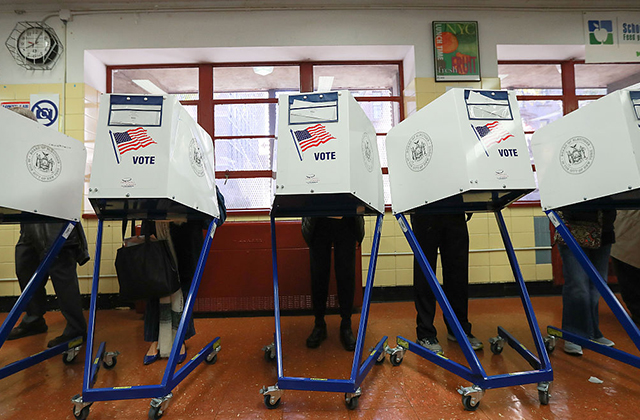Nationally, voters are heading to the polls today (November 8) to elect their future reps: president, congressperson or district attorney. But in a few states, voters will also have a say on the climate through ballot initiatives.
Climate legislation all too often benefits some communities at the detriment of others. Starting on the West Coast, Colorlines looks at three states to examine the ballot measures and who stands to win or lose if they are passed.
Initiative 732 | Washington State
What will it do? Create a carbon tax, which aims to reduce household carbon emissions by taxing the individual’s consumption of fossil fuels—perhaps on a utility bill or at the pump. No U.S. state has done this so far.
Who supports it? Supporters claim the initiative “makes polluters pay for dumping carbon pollution into our skies,” “promotes clean energy by making it more cost-effective,” and “makes the state’s tax system more fair for everyone.”
The arguments against it? Many, including Black Lives Matter co-founder Alicia Garza, think it doesn’t go far enough to take communities of color into account. Garza said that I-732 “prescribes solutions on our behalf, by ignoring what we have been calling for for many years,” (like green jobs and a just transition), reports In These Times.
How will it impact communities of color? Sierra Club, which issued a “Do Not Support” position on the initiative, wrote that communities of color "are almost always the ones most impacted by pollution and climate change, and as a result they need to be at the front and center of discussions for how to address the problem and mitigate the impacts of both climate change and environmental policy. That wasn’t the approach taken by I-732." They claim that the iniative fails in bringing them the tools they need to combat climate change like "more investment in green jobs, energy efficiency, transit, housing, and renewable energy infrastructure."
Amendment 71 | Colorado
What will it do? Amendment 71 would require a 55 percent majority to make an initiative law, as well as require petitions to have signatures of 2 percent of all registered voters in the state (as opposed to 5 percent of the most recent election voter turnout). This will make it more difficult to get any iniative on the ballot.
Who supports it? The energy industry, which has funded almost 75 percent of the money behind it, reports InsideClimate News.
The arguments against it? State environmentalists have been pushing for fracking bans through ballot initiatives, but they haven’t succeeded in getting any on the ballot. They believe this is the industry’s way of getting back at them for attempting to curb the invasive drilling process."Basically what oil and gas is trying to do is shut down any future initiatives on oil and gas," said Kaye Fissinger, president of one of the citizen groups behind the anti-fracking battle, to InsideClimate News.
How will it impact communities of color? While Colorado is a relatively White state—almost 88 percent—pockets of the state run majority Brown or Black. Bella Romero Academy in Greeley, Colorado is one of these places. Greeley’s public middle school is home to an almost 90 percent Latinx student population, with 92 percent of its students coming from low-income households. Oil interests have proposed to place 24 wells, 18 oil tanks and other fossil-fuel facilities just 1,350 feet away from the school, according to the Sierra Club. Students and nearby residents are the people most vulnerable to fossil fuels and the pollution that often accompanies their extractive processes—with diesel trucks running down roads and gas flares burning on fracking sites. They are also the ones whose health is at risk if ballot initiatives become harder to get on the ballot, let alone pass.
Amendment 1 | Florida
What will it do? Amendment 1 gives people in Florida the constitutional right to own or lease solar equipment. However, as the Atlantic pointed out, they already have this right through state statute. The amendment also clearly states that it will ensure that “consumers who do not choose to install solar are not required to subsidize the costs of backup power and electric grid access to those who do.”
Who supports it? Players close to the fossil fuel industry.
Arguments against it? Depending on how some interpret the language, the amendment could prohibit net metering, the process of solar panel owners selling surplus energy back to their utility company. People who don’t use solar panels could potentially see this as a subsidy, some argue. A Miami Herald exposé quoted Sal Nuzzo, vice president of a think tank in bed with Florida’s largest utilities, calling the measure an "incredibly savvy maneuver" that "would completely negate anything [pro-solar interests] would try to do either legislatively or constitutionally down the road.”
How will it impact communities of color? Net metering is part of what makes renewables so appealing, as it revolutionizes the way energy is consumed and capitalized. It can potentially put money back into the pockets of its users—which is one reason why environmental justice organizations hope to get renewables into overburdened and low-income communities.
Utility payments make up 7.2 percent of household income spending, according to a report by Energy Efficiency for All, an organization that works on the intersections between housing and energy efficiency. For Florida, which houses a large Latinx and immigrant population, switching to profit—rather than pay—metering can have a significant impact.
